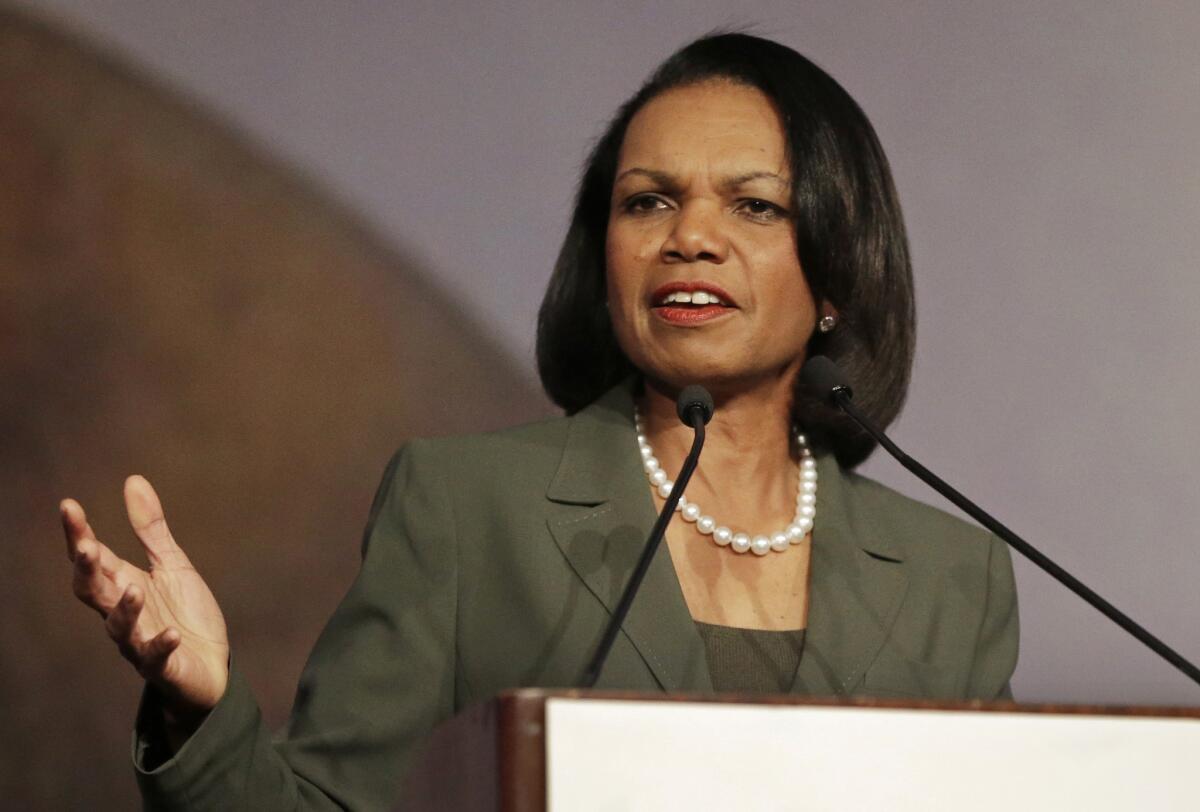The commencement speaker boondoggle

Former Secretary of State Condoleezza Rice: Will her withdrawal from the Rutgers commencement leave an unfillable void?
With commencement season heading into full swing, the scandal du jour is the rising number of speakers hounded off their graduation podiums (podia?) by student protests or threats thereof.
Rutgers graduates and their parents will be deprived of the thoughts and exhortations of George W. Bush’s former secretary of State, Condoleezza Rice, Haverford College grads of the insights of former UC Berkeley Chancellor Robert J. Birgeneau, Smith College of those of International Monetary Fund managing director Christine Lagarde, and Brandeis of those of human rights activist Ayaan Hirsi Ali. These cases are all being pointed at by conservatives as examples of silencings by brutish liberals and violations of the principles of academic freedom. That’s a gross distortion of reality, which we’ll get to below.
But first, let’s turn to a commencement-related issue that gets much less attention than it deserves: the grotesque prices that many campus speakers demand for their appearances. Rice, for example, was in line to collect $35,000 along with her honorary doctorate from Rutgers — apparently not enough to steel her against some harsh words from the gallery. Her invoice put her well ahead of two previous Rutgers speakers, Nobel-winning novelist Toni Morrison, who got only $30,000 for the 2011 commencement, and “Jersey Shore” personality Snooki, who held out for $32,000 for a non-commencement appearance that same year.
Other speakers on the university circuit have done as well, or better. About 30% of colleges and universities pay for commencement addresses, as a lecture expert told my colleague Carla Hall in 2011.
University of Colorado law professor Paul Campos believes his institution is the record-setter in speaker largess, based on an encounter he had a few years ago with former U.N. Secretary-General Kofi Annan, who confided to him in a Boulder hotel bar that he was being paid $160,000 for a single 50-minute speech, including $100,000 for the talk itself and $60,000 in travel expenses. In the previous two years, Campos learned, the same $100,000 had been handed over to Rudy Giuliani and B.B. King, who probably earned less for an average gig playing his guitar.
When it comes to commencement, what are these people being paid for? Has anyone ever heard a truly memorable graduation speech? At my graduation from Colgate University, the speaker was the great progressive Supreme Court Justice William O. Douglas, who was then 74 and distinguished himself by being totally incoherent. (If you want to know the year, do your own research.)
A few years earlier, when the commencement speaker was Secretary of State William P. Rogers, an alumnus, scores of students walked out on his speech, a reasonably polite way of protesting the Nixon administration’s conduct of the Vietnam War.
That brings us to the modern spate of speaker protests, and the distinction between silencing speakers and protesting their receiving the honor of a degree.
A commencement address is different from the average speaking engagement, which aims to provide the speaker with a platform to communicate his or her views and knowledge, no matter where they land on the political or social spectrum. Commencement invitations signify, or should, that the speaker embodies standards and values with which the university and its alumni wish to be identified.
Under the circumstances, then, it’s quite justified for the students at Haverford College to question whether former Berkeley Chancellor Birgeneau is a proper commencement speaker, given his supposed role in the 2011 campus confrontation between Occupy protestors on one side and the campus police and Alameda County sheriff’s deputies on the other. If Rutgers students think Condoleezza Rice’s role in the Iraq War disqualifies her as a commencement speaker, that’s not tantamount to silencing her. (It’s not as if she doesn’t have access to plenty of lecterns worldwide.)
Then there’s the Ayaan Hirsi Ali case. The Somali-born Hirsi Ali is an outstanding spokesperson for women’s rights. But she’s also an uncompromising and extreme critic of Islam in general. The Brandeis administration blundered by offering her an honorary degree for her activism on behalf of women’s rights, and only belatedly discovering the other, objectionable side of her world view. At that point it withdrew its offer of the degree.
But the university also proffered her an invitation, albeit vaguely worded, “to join us on campus in the future to engage in a dialogue.” If the invitation was genuine, she should have accepted. Instead, she turned it down with the accusation that Brandeis and her critics “simply wanted me to be silenced.”
Any way you cut it, the university-speaking circuit seems to have experienced some striking inflation in recent years. At commencement time, most pay cash, though they might honor the occasion better if they followed the model crafted by George Washington University and First Lady Michelle Obama in 2010. In return for her agreement to serve as commencement speaker, the students pledged to perform 100,000 hours of community service.
More to Read
Inside the business of entertainment
The Wide Shot brings you news, analysis and insights on everything from streaming wars to production — and what it all means for the future.
You may occasionally receive promotional content from the Los Angeles Times.











